
As Editor of Online Marketplaces, I've spent the last four years studying real estate portals.
I've interviewed dozens of portal bosses, collected more than 180,000 data points and published almost as many words about portals as are in the King James Bible but I still think I would be rubbish at running one of these companies.
The code they're written in might be the same all over the world but the realities they operate under are very different from one country to the next. Sometimes it seems that no matter what these businesses do, their bottom line is just a function of the market they operate in.
So what levers can real estate portal companies pull to grow and which work the best? What can portal CEOs actually do to steer their businesses through the swells and storms of their markets?
Luckily I work with someone who has spent 25 years thinking and speaking about this stuff. I decided to ask Simon Baker some dumb questions about running a real estate portal...
Reducing costs would seem to be the place to start for any new CEO, at least to my mind. But, as Simon explained, it isn't necessarily the first thing all new portal CEOs think about. According to Simon the most effective thing any new boss can do is actually related to what's coming into the business not what's being spent...
"It Depends. If you're taking over Rightmove, you're not going to sit around thinking about cutting costs... Actually the most valuable thing to do in businesses is usually on the revenue-generating side."
So how much can executives really control the costs associated with these businesses? They're called 'overheads' for a good reason after all.
As an example, Frontier Digital Ventures is an ASX-listed company that operates real estate portals in developing markets around the world. In 2021 FDV bought two assets in Latin America (Yapo and Encuentra24) and then got to work with the scissors.
The company said in its 2022 report that it expected the cost restructuring of those businesses to save around A$3 million in FY23.
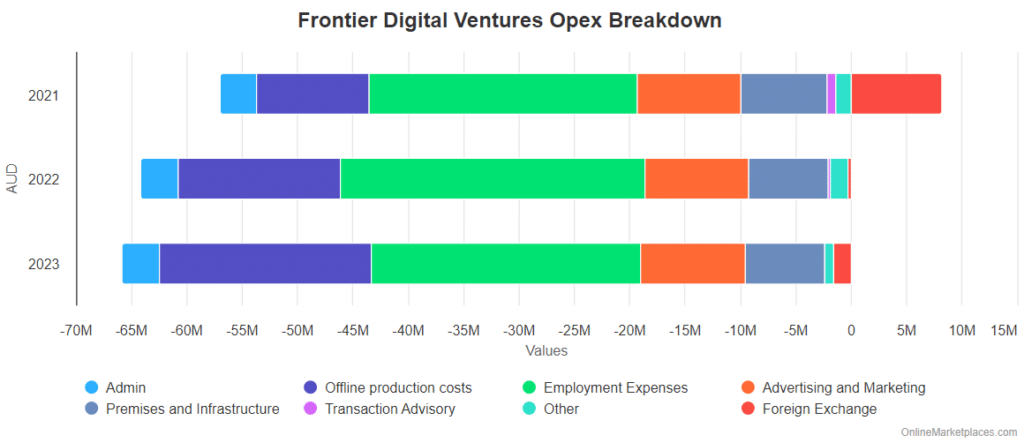
Saving three million is great but restructuring is an onerous task. It almost always involves people losing their jobs.
How demoralising must it be then to sit down with a spreadsheet, spend late nights finding ways to reduce spending only for a third of the gains you make to be wiped out on the end-of-year balance sheet by foreign exchange losses?!
While that sort of thing would keep me awake at night, Baker says portal bosses need to see these things dispassionately and that, in the case of currency fluctuations at least, some things just aren't such a big deal.
"How you think about the problem and your temperament is quite critical in being successful... If you're running a company in Chile, and you're paying your employees in local currency and you're earning local currency, the currency fluctuations are actually quite irrelevant."
Real estate portals are at their core just giant, online shop windows. The more people looking in the window, the better the business. So traffic might well be the lever that makes the most sense for a new CEO to try and pull and not just because of the extra eyeballs. As CoStar is proving with Homes.com traffic numbers are also useful for PR.
But is traffic a bit of a vanity metric for portals? Baker's answer to my question was characteristically succinct.
"No, it's certainly not a vanity metric."
"One thing is absolutely sure, if you have zero traffic, you will have zero leads. And if you have zero leads, no one will want to actually spend any money with you advertising."
So traffic is not just a vanity metric but it certainly does serve a PR purpose for real estate portals
"A lot of those traffic metrics are all about saying, I'm the biggest, you're an advertiser, so you better advertise with me, because I've got the audience."
While the PR benefit might be very obvious, the relationship between traffic and portal profit is not always so clear. Although the shop window logic is sound, there will always be caveats and exceptions.
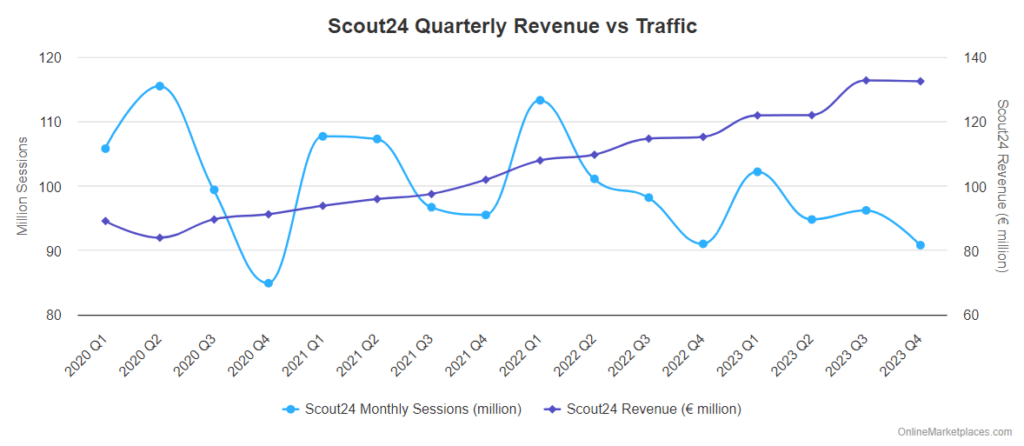
The chart above shows that, in Germany at least, traffic and revenue aren't necessarily correlated.
According to Baker, there is an increasingly fine line between prioritizing the volume vs the quality of leads. High traffic and volume of leads look good on an agent's dashboard but don't necessarily sell houses. On the other hand, a portal delivering fewer, better-quality leads can have its own issues.
Any marketplace delivering better quality leads than its rivals is almost certainly taking more end-user data and is likely doing some work to qualify leads before sending them to agents, opening itself up to accusations of taking data that would have previously been in the hands of its customers.
Is that a concern for portal CEOs? Baker thinks the smart real estate agents don't harbour resentment towards portals handing them fewer, better-qualified leads.
"The smart ones are going, 'you mean I can do more sales per month and thus put more money in my pocket because you're going to do a bunch of the grunt work for me? Give me those leads all day, every day. And by the way, I'm happy to pay more for those leads because I know that I'm closing out twice as many deals from leads from you. So I'm happy to pay 50 % more.'"
There are plenty of real estate agents around the world who think real estate portal boss is the easiest job in the world—just up your prices every year then sit back and bask in shareholder adulation.
I'm pretty sure it isn't as simple as that.
Price rises must be tricky to navigate for marketplace execs. They have to be justified, communicated properly and enacted at the right time. And perhaps the top-line cash you'll get from increasing your prices won't make its way to your bottom-line profit.
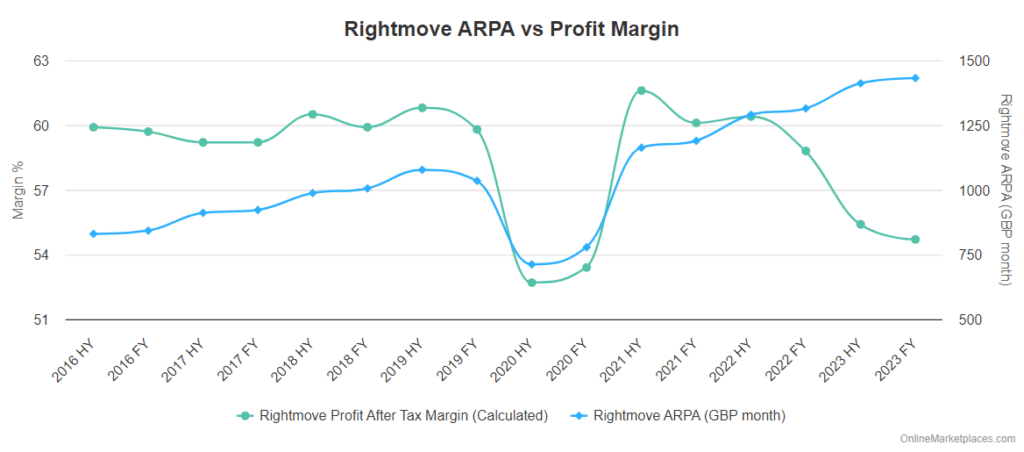
A few times each year a story will reach the pages of Online Marketplaces about agents complaining about portal price increases. These stories always seem to follow a pattern and they disappear quickly.
Baker has seen and dealt with enough agent complaints to have formed a robust opinion on them...
"Agents are gonna be unhappy about any price increase for eternity. Yet, they're driving around in Mercedes."
So do real estate portal CEOs tend to overthink price increases or shy away from them unnecessarily? Simon told the story of some portal founders who, needing to maximise profits for their earn-out, doubled their prices overnight and (eventually) only lost around 5% of their customers.
"Most people [portal bosses] are so worried about the noise that they then don't do the action [price increases]."
"I used to get my team to give me the average real estate agent's P&L—their revenue, number of sales, times commission, less all these expenses, because I want to know what they are really making. I wanna know what they're spending."
Most real estate marketplaces have expanded their business sideways over time. The chart below is from our 2022 study on real estate portal companies' adjacent revenue streams. The size of each tile represents how many portals we found that were in each adjacent revenue stream.
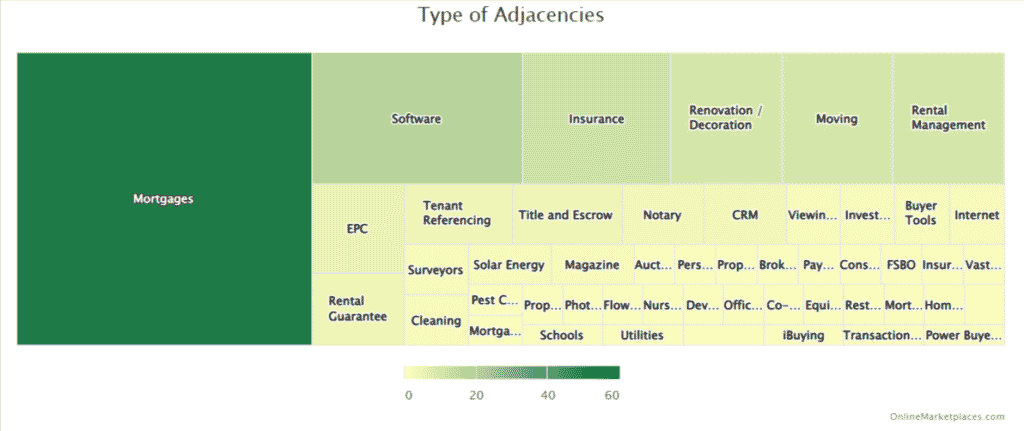
But as the leader of one of these companies, how do you know when the time is right to move into adjacent revenue streams? According to Baker, there is no exact science here and diversifying a portal business doesn't necessarily mean moving into adjacent services.
"Business is not a scientific formula, right? And anyone who thinks that is going down the wrong approach."
"The super core business is getting agents or developers to put their listings onto a website. The next level of diversification is saying, well, I'll tell you what, you can spend more money and go to the top of the search. You can also put your advertisements around the outside, you can do all that sort of stuff and get smart about how you put that all together and how you price it."
Most real estate portals do eventually diversify their way out of their home turf though and most go into mortgage. It might be the most popular and obvious choice of adjacent revenue stream for real estate portals but, as Simon told me, most organically grown portal mortgage ventures fail.
"They fail because the people who are building in the inside think they can build the next level. An expensive lessons you learn is if you're really good at one thing, keep doing that one thing until you've sucked every ounce of life out.
It's just a different cup of tea. You just don't know how to do it. You think you know how to do it because you've got someone sat down and did a nice little PowerPoint presentation and that sort of sounds like nice and easy with some diagrams, but execution is really hard."
He's speaking from hard-lived experience. As CEO of Australian market-leading portal operator REA Group, Simon tried to steer the company into the mortgage lane in 2005 only to pull out 18 months later. REA Group is now on its third attempt to get into mortgages having bought brokerage Mortgage Choice in 2021, an approach Baker thinks is the way to go.
"If you are going to go into those areas, acquire, spend the money, buy the expertise, buy the knowledge, buy the customer base, buy the learning, the experience, and make sure you then get out of the way and just provide as much rocket fuel to make it work."
How many agents (potential customers) are there? How much commission do they make? How many home sales are there and what is the average sale price?
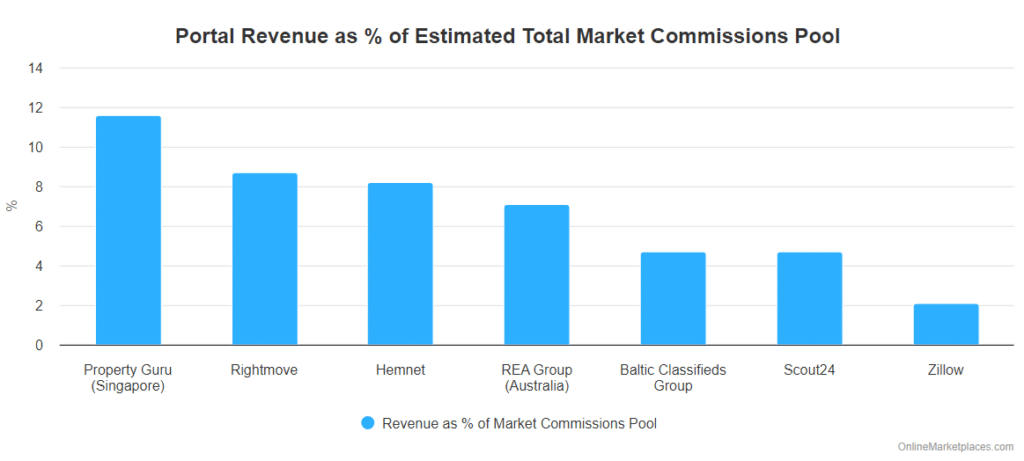
All of these things affect your business as a marketplace but according to Baker, they are impossible to influence as a portal and not worth wasting time on.
"Talk to Zameen [Pakistan], talk to ShweProperty in Myanmar. The answer is you cannot change the macro environment. You've either got government coups, you've got a whole range of stuff that is just literally out of your control and you have to operate in that environment. So don't push against it, ride the wave and maximize the output."
But can you change the way you get paid? Could you maybe start doing for-sale-by-owner listings? Can you charge for seller leads? Or could your business even reach the promised land and introduce vendor-paid advertising like Irish market leader Daft.ie is currently trying to do?
Here the odds are still stacked against real estate portals looking to change things as they're working against "decades of ingraining".
"Changing those market dynamics is very, very hard. And one that I would not try to do. I would try to actually ride the wave and ride the wave better than my competitor."
There are plenty of pitfalls and shiny objects to avoid for real estate marketplace CEOs and plenty of ways to go about leading a business. When asked for his opinion on the most important factor for portal bosses, Baker didn't need more than a second to respond...
"Absolute clarity on what you're going to do."
"I remember very vividly back in the day sitting there as we're building REA. We were getting traction with Realestate.com.au, getting agents to sign up and of course, people in the team came up with these wonderful ideas why don't we do this why don't we do that. The next bright, shiny bauble that's over there.
And I remember thinking, that's interesting. And then I'd have to catch myself and say, no, we're going to do what we did yesterday. We're going to do it again today. We're going to do it tomorrow. We're going do it for the next year."